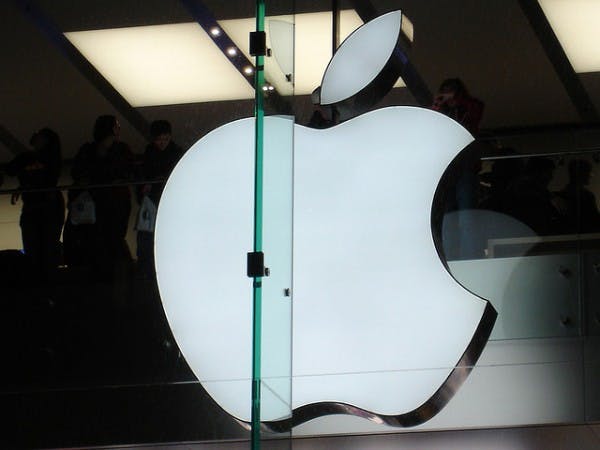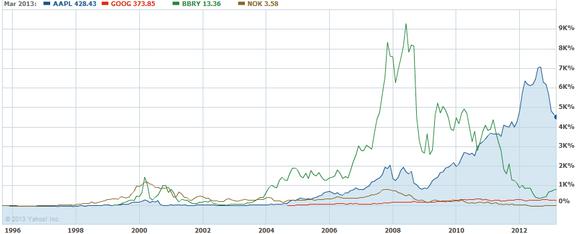A recent report suggested that Apple Inc. (NASDAQ:AAPL) could bring its focus towards increasing dividends or buying back shares. The report cited excessive cash, a decline in share price, and shareholder activism as reasons the computer giant would consider returning cash to shareholders. Apple Inc. (NASDAQ:AAPL) has more than $137 billion, but a large chunk is overseas.

While investors generally seek companies that have a shareholder-friendly management willing to maximize value for investors, for Apple, it is different. The technology sector is fiercely competitive and any distractions that take away money or resources from innovation will eventually hurt the company. For Apple Inc. (NASDAQ:AAPL), the competition is escalating exponentially.
First, Research In Motion Ltd. (NASDAQ:BBRY) exhibited strong momentum for its new BlackBerry 10. Investors could assume the company will fail to gain traction in the United States, as BlackBerry 10 is now available. This assumption could also be incorrect. Investors should watch for Apple iPhone users switching to BlackBerry because they want something different.
Second, and more seriously, is Google Inc (NASDAQ:GOOG) Android. Samsung’s Galaxy S IV was announced on Mar. 14. Meanwhile, the HTC One will be released as early as April. Google’s Nexus 4 was in high demand during the holidays and its sales were restrained only due to the lack of availability.
No Apple innovation
Apple Inc. (NASDAQ:AAPL) expended a tremendous amount of resources in developing and launching its own mapping software, when Google Maps could have been sufficient. Launching an incomplete product tarnished its reputation. Even though iPhone 5 sales were more than respectable, investors voted against Apple by driving shares lower.
An iPad Mini was launched to enable the company to compete against Android at the lower-sized tablet segment. Profit margins for the iPad were solid, but the mini cannibalized Apple’s own iPad sales.
Investors questioning management
Einhorn’s surprise legal win against Apple adds doubt for investors towards management. In its legal battle against Samsung, the federal judge ordered a new trial on damages for some of the products at issue. $450.5 million was also cut from the damage claims.
Management still deserves credit for operational excellence: Apple took 72% of all handset profits worldwide. In contrast, Samsung took 29%. Looking ahead, IDC predicts that Apple will face growing competition from Android-based tablets. Investors appear to sense the growing threat for Apple. Shares are down 19% in the year-to-date. The stock is currently valued at a P/E of 9.7, with a forward P/E of 8.52. Apple is valued so low that Dell Inc. (NASDAQ:DELL) has a higher P/E (at 10.6).
In the short-term, investors are placing their faith in Android and Apple Inc. (NASDAQ:AAPL)’s smaller competitors, Blackberry and Nokia. Investors should keep in mind that Apple shares are up over 12-fold since 1995, while Blackberry, Nokia, and Google returned far less in that same time period.
Apple Chart
6 Month
1995 – Present

Data Source: Yahoo Finance
Dividend inconsequential to cash flow
With a 938.8 million share float, Apple currently spends nearly $10 billion per year in dividends, which yields 2.47%. Microsoft Corporation (NASDAQ:MSFT) currently pays a dividend that yields 3.3%. Apple needs to increase dividend payments by $2.06 billion to match yields offered by Microsoft.
Apple has more than enough cash from operations to fund a small dividend increase:
| 3/31/2012 | 6/30/2012 | 9/30/2012 | 12/31/2012 | |
|---|---|---|---|---|
| Net Cash From Op Activities | 31,531.00 | 41,720.00 | 50,856.00 | 23,426.00 |
Data Source: Kapitall.com
Conclusion
If history could be used as guide, Microsoft would best illustrate why dividends do not matter in improving the share price of a company. Microsoft shares have remained range-bound after the dot-com crash. Yet when Microsoft began paying dividends in February, 2003, shares still remained range-bound. Fundamentally, the software giant found itself stuck in the PC market, unable to find its position in the mobile space to extend its growth.
For Apple Inc. (NASDAQ:AAPL), the situation is vastly different than that of Microsoft. Apple generates extraordinary profit margins. Investors are voting against Apple at this time because they anticipate competition from Android will erode these profits.

Source: @asymco
The short-term decline in Apple shares is frightening for investors who bought shares in the last year. Apple shares could be reverting to the mean as it gives back some of the extraordinary gains made over the last several years. A dividend increase rewards investors and encourages them to hold shares, rather than to speculate on them. The cash returned to investors in some form will benefit long-time shareholders.
For short-term speculators, Apple Inc. (NASDAQ:AAPL)’s valuation will likely be restrained by chronic worries of competition, no matter what innovations the company introduces to its iPhone or iPad. Apple needs to announce something bigger than that to appease speculators.
The article Apple: How Much Returning Cash Really Matters originally appeared on Fool.com and is written by Chris Lau.
Copyright © 1995 – 2013 The Motley Fool, LLC. All rights reserved. The Motley Fool has a disclosure policy.



